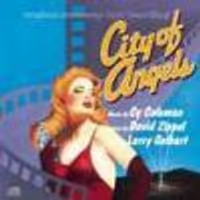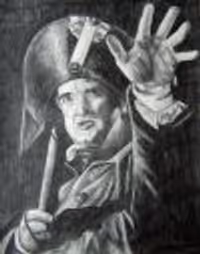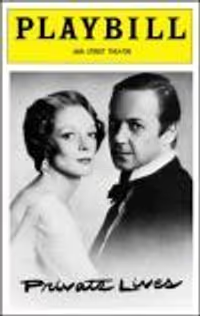Brecht's alienation effect in Broadway musicals?
#1Brecht's alienation effect in Broadway musicals?
Posted: 12/5/11 at 11:47pmHas Brecht's alienation effect ever been utilized on the Broadway stage for a musical?
FindingNamo
Broadway Legend Joined: 7/22/03
#2Brecht's alienation effect in Broadway musicals?
Posted: 12/6/11 at 1:25amIs this for a paper? If you consider the more accurate translation to be "distancing effect" then you could argue both "Passing Strange" and "Spring Awakening" utilized that technique, to think of two recent examples.
#3Brecht's alienation effect in Broadway musicals?
Posted: 12/6/11 at 1:29am
COMPANY
The songs comment on the story.
#4Brecht's alienation effect in Broadway musicals?
Posted: 12/6/11 at 4:14amCabaret comes to mind especially since Harold Prince in a interview said he was greatly influenced by Brecht.
#5Brecht's alienation effect in Broadway musicals?
Posted: 12/6/11 at 4:23amIf by "alienation effect" you mean eradicating the fourth wall and confronting the audience with the fact that they're watching a play - then The Drowsy Chaperone would be a good example.
#6Brecht's alienation effect in Broadway musicals?
Posted: 12/6/11 at 9:05am
Chicago is a good example- especially the current production.
The songs comment on the story, the philosophies of the characters, and implicitly the audience.
The fourth wall is almost nonexistent.
Songs and staging exist within a heightened theatrical reality designed to abstract them from being "real" within the world of the show.
#7Brecht's alienation effect in Broadway musicals?
Posted: 12/6/11 at 9:06am
Frequently, including, of course, Brecht musicals.
CHICAGO, especially it's record-breaking revival, is a clear example of Brechtian technique.
ghostlight2
Broadway Legend Joined: 12/5/04
#8Brecht's alienation effect in Broadway musicals?
Posted: 12/6/11 at 9:11amI'll get bricks thrown at me for this, but...[title of show], especially at the very end when the set was flown out to reveal a stark backstage.
#9Brecht's alienation effect in Broadway musicals?
Posted: 12/6/11 at 9:33am
Blood Brothers.
Telling the audience how the story ends at the start of the show to get the audience intellectually engaged rather than emotionally.
Actors playing more than one character and making it very obvious e.g "were'nt you the milkman?"
Narrator speaking directly to the audience, commenting on the action.
minimal set.
Songs.
#10Brecht's alienation effect in Broadway musicals?
Posted: 12/6/11 at 9:44am
As Brecht himself pointed out, the audience doesn't WANT to be alienated, so they always adapt to any new techniques that attempt to do so. They want to be sucked in and suspend their disbelief.
The old things like direct audience address, comment songs, highlighting the "unreal" nature of theatre - these are all taken for granted by today's audiences, and no longer even come close to "alienating" anyone.
#11Brecht's alienation effect in Broadway musicals?
Posted: 12/6/11 at 9:58amThrough costume and other design choices the Chicago revival distances the audience from the natural setting of the story, a self-referencing to the here and now of the performance which reels the audience in in pure Brechtian terms.
Jon
Broadway Legend Joined: 2/20/04
#12Brecht's alienation effect in Broadway musicals?
Posted: 12/6/11 at 10:44amI can't believe no one has mentioned URINETOWN.
#13Brecht's alienation effect in Broadway musicals?
Posted: 12/6/11 at 10:51am
It's hard to find a show now that doesn't use at least some of the techniques Brecht utilized in production. It's not audacious when the audience can see lighting instruments- it's expected. It's not audacious when the presence of only a door represents an entire wall or building.
Until the 1930s or so, it was.
#14Brecht's alienation effect in Broadway musicals?
Posted: 12/6/11 at 11:02am^ What Jon said. I was about to point out URINETOWN myself.
#15Brecht's alienation effect in Broadway musicals?
Posted: 12/6/11 at 12:32pm
Uhh...You do know that Brecht wrote a musical that has been performed on Broadway multiple times...Ever hear of The Threepenny Opera?
Other "Brechtian" shows are Cabaret (most assuredly the Mendes revival) and even some of the staging of Evita.
#16Brecht's alienation effect in Broadway musicals?
Posted: 12/6/11 at 12:36pmBrecht wrote other musicals as well including Happy End which received a Broadway production.
FindingNamo
Broadway Legend Joined: 7/22/03
#17Brecht's alienation effect in Broadway musicals?
Posted: 12/6/11 at 12:39pmGuys, this is one of the most accessible school papers we've ever co-written.
#18Brecht's alienation effect in Broadway musicals?
Posted: 12/6/11 at 1:23pmI don't know who this Brekt fellow is, but I was super alienated by Spider Man.
WOSQ
Broadway Legend Joined: 7/18/03
#19Brecht's alienation affect in Broadway musicals?
Posted: 12/6/11 at 1:31pm
I think it is "alienation affect".
Any show that uses commentary is a descendant of Brecht.
#20Brecht's alienation affect in Broadway musicals?
Posted: 12/6/11 at 1:36pm
This is disappointing. I thought this thread was about http://www.imdb.com/title/tt0094631
#21Brecht's alienation effect in Broadway musicals?
Posted: 12/6/11 at 1:39pm
I think if Bertolt Brecht were alive today, his answer to the question would be, "Ethel Merman."
Apparently...when Brecht and his wife Helene Weigel were in New York in 1948, they attended several Broadway shows, including the original production of Annie Get Your Gun. Merman had a famous running gag every time she saw Frank Butler: She dropped her jaw and stared, as if she had never seen anything so beautiful.
If legends can be believed...Helene Weigel was so taken by Merman's long, slow, slack-jawed take that it became the basis for Mother Courage's famous "silent scream."
Weigel told producer Cheryl Crawford that Ethel Merman was the only "indestructible woman" she had ever met, and thus, the basis for Weigel's characterization.
By way of confirmation, Glenda Jackson also said that Lotte Lenya once told her that Weigel's nickname for Merman was "Mother Courage." According to Jackson, Weigel saw Mother Courage as having Merman's "big, blousy" quality.
In 1961, Cheryl Crawford and Jerome Robbins were (inexplicably) contemplating a Broadway production of Mother Courage, and they asked Weigel who should play the title role. Weigel's response: Merman.
Weigel as Mother Courage:

Merman as Annie Oakley:

FindingNamo
Broadway Legend Joined: 7/22/03
#22Brecht's alienation effect in Broadway musicals?
Posted: 12/6/11 at 1:42pmA couple of footnotes for those stories and we're guaranteed an A, PalJoey.
#23Brecht's alienation effect in Broadway musicals?
Posted: 12/6/11 at 3:05pmI read this years ago and can't source it now, but whenever Toscanini was in New York, he loved to be taken out to Merman's latest show, preferably on opening night. He called her "Iron Lung Merman."
#24Brecht's alienation effect in Broadway musicals?
Posted: 12/6/11 at 3:32pmNot for a paper. Just been reading Peter Brook's "The Empty Space" and am trying to think if Brecht has ever translated over to the musical stage...
Videos














